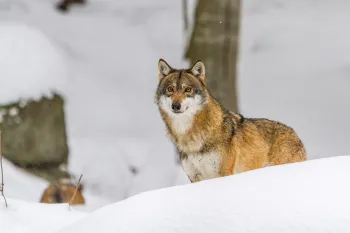Today, Biber, a school librarian turned campaigner for environmental advocacy group Clean Water Action, works with Humane World for Animals to keep wolves safe from trophy hunting and recreational trapping in Michigan (a policy voters twice endorsed). She says the fates of the Anishinaabe and the gray wolf are intertwined: Both were nearly exterminated in the 19th and 20th centuries, with wolves in Michigan persecuted and dwindling to six individuals, and Anishinaabe culture and language fading as the U.S. government forced Indigenous children into boarding schools. Now both are reviving.
“When [our] relatives are around, that gives people a sense of hope,” says Biber. “We cannot live our teachings, our core values, if there are no wolves. We can’t understand what it means to be home and to be Anishinaabe.”
Biber’s wolf advocacy started when she moderated a 2021 town hall held by the Anishinaabek Caucus of the Michigan Democratic Party at which two of our staff presented. Soon Biber was speaking to state wildlife officials and legislators.
Amanda Wight, senior wildlife protection program manager for Humane World for Animals, says Biber’s ability to communicate the spiritual significance of Ma’iingan helps persuade: “You can’t help but lean in when she talks.”


